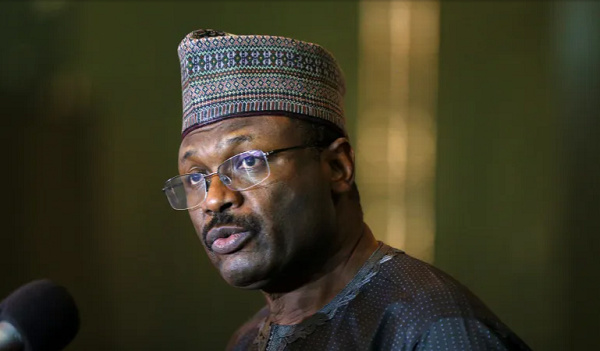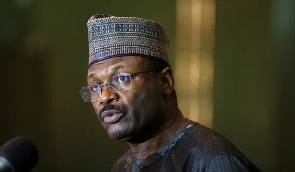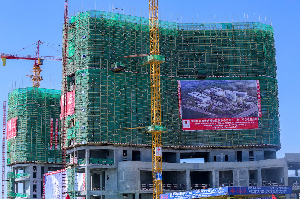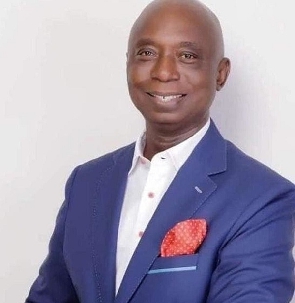Attacks on electoral commission spark concerns for Nigeria polls

On Sunday, Nigerian policemen repelled an attack by unknown gunmen on the office of the Independent National Electoral Commission (INEC) in the southeastern state of Enugu.
The incident has reinforced persistent doubts that Nigeria’s general elections will proceed as planned next month.
Banditry in the North West, secessionists in the South East and violence in the North East by armed groups allied to ISIL (ISIS) have already contributed to an atmosphere of rapidly escalating insecurity.
But the attack on the electoral commission’s offices and recent comments from a top INEC official have amplified growing concerns around the elections.
“If the insecurity is not monitored and dealt with decisively, it could ultimately culminate in the cancellation and/or postponement of elections in sufficient constituencies to hinder the declaration of elections results,” said Abdullahi Abdu Zuru, chairman of INEC’s Board of Electoral Institute, at the validation of election security training resources in Abuja last week.
In December 2022, three attacks including targeted arson and the use of explosives rocked INEC offices in the southeastern state of Imo, leaving five people dead.
In recent years, there have been targeted attacks against the commission’s facilities and staff in the country’s South East as secessionist agitation by Indigenous People of Biafra (IPOB) has turned violent, prompting a fierce military response from the government.
These incidents are the latest in the long-running pattern of violence around Nigeria’s usually keenly contested elections, but experts say this is a new wave that takes insecurity in the country into uncharted territory.
“Historically, as we approach the election cycle, there is always heightened violence in the country,” Oluwole Ojewale, Dakar-based analyst at the Institute of Security Studies Africa told Al Jazeera. “What has now changed is we now have heightened attacks on INEC infrastructure. We have not seen this dimension before,” he said.
An increase in sophistication
Last month, the electoral commission said it had recorded 50 attacks in 15 of the country’s 36 states and the capital since 2019. Data from the Armed Conflict Location and Event Data Project (ACLED), suggests that might be a conservative estimate.
According to ACLED data shown to Al Jazeera in December 2022, there have been more than 100 attacks associated with elections since the last elections in 2019. At least 67 of them were recorded on non-election days between January 2019 and December 2022.
The year with the highest incidence of violence, with 24 events, was 2019. There were 21 attacks in 2020, 14 in 2021 and 9 in the last year.
Despite the drop, analysts say the episodes represent an increase in precision and sophistication as there are now more attacks focused on high-level offices and with more explosives being used.
On December 12, 2022, the day collection of Permanent Voters’ Cards began nationwide, INEC’s state headquarters in Imo was attacked at 3 am. It was the third attack in 12 days on an INEC office and targeted the Election and Party Monitoring department, local newspapers reported.
Overall, the South East leads the pack with at least 30 attacks since 2019. There were 12 attacks during this period in the South West region, most of which were attributed to riots following the largely peaceful anti-police brutality protests of October 2020. By contrast, the least number of attacks happened in the North East and North West regions – three each.
“The attacks, specifically in the South East, aim to derail the already fragile electoral process, block the will of people reflected in polls and further exploit the sense of negligence and marginalisation felt among local communities,” Mucahid Durmaz, a senior analyst covering West Africa at London-based risk analysis firm Verisk Maplecroft, told Al Jazeera.
Imo experienced more attacks against INEC facilities and staff than any other state in the country with at least 13 events being recorded by ACLED since 2019.
The majority of these attacks have been reportedly perpetuated by “unknown gunmen”, a catchall phrase used to refer to paramilitary wings of secessionist groups. Experts agree that the attacks are to delegitimise the electoral process and boost their separatist agenda.
“The right-wing elements [of IPOB] see the continuous engagement with the democratic process through the elections as undermining their objectives of seceding from Nigeria,” Ojewale said.
Political and security implications
As Nigeria inches closer to the elections, widespread worry about insecurity will be at the top of the list for the 93.4 million people eligible to vote next month.
“The sophisticated attacks have shown a significant increase in the capacity and strength of these armed groups,” Durmaz told Al Jazeera. “To avert possible assaults on high-level officials and offices is critical for conducting free and transparent elections.”
Each of the three major candidates has vowed to tackle insecurity and revamp the economy. They have also separately promised to dialogue with IPOB and address the feelings of marginalisation fuelling the agitation, a stance dissimilar to the current administration’s policy.
But the vote has to happen first.
Traditionally, Nigeria’s elections have often been characterised by widespread voter apathy. In 2019, only a third of registered voters participated in the elections and analysts reckon insecurity could lead to a similar turnout this year, or worse.
INEC’s admission that the election could be cancelled or postponed if security guarantees cannot be met has led to mounting concern about looming political and security implications.
“The biggest issue will be providing an apt justification to a situation that everyone has been aware of since INEC announced the electoral timetable,” said Afolabi Adekaiyaoja, a research analyst at the Centre for Democracy and Development in Abuja.

“Any postponement will need to be followed with the relevant assurance that the time for the delay will result in tangible progress and these are guarantees that can’t necessarily be met,” he added.
Source: aljazeera.com






